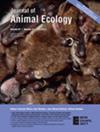Water economics of African savanna herbivores: How much does plant moisture matter?
IF 3.5
1区 环境科学与生态学
Q1 ECOLOGY
引用次数: 0
Abstract

求助全文
约1分钟内获得全文
求助全文
来源期刊

Journal of Animal Ecology
环境科学-动物学
CiteScore
9.10
自引率
4.20%
发文量
188
审稿时长
3 months
期刊介绍:
Journal of Animal Ecology publishes the best original research on all aspects of animal ecology, ranging from the molecular to the ecosystem level. These may be field, laboratory and theoretical studies utilising terrestrial, freshwater or marine systems.
 求助内容:
求助内容: 应助结果提醒方式:
应助结果提醒方式:


